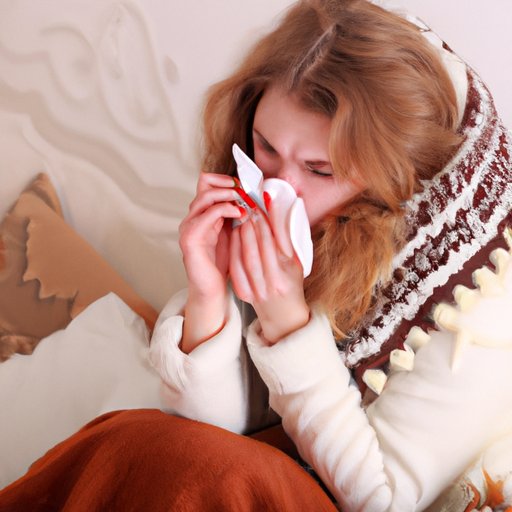
I. Introduction
Winter can be a magical time of year filled with holiday cheer and snow-filled adventures. But with the dropping temperatures, people often associate the colder weather with an increased risk of getting sick. In this article, we will explore whether being cold can actually make you sick or if there’s more to the story.
II. Debunking the Myth: Does Being Cold Really Make You Sick?
Many people believe that being cold is the direct cause of illnesses like the flu, but this is a common misconception. According to various studies, the cold temperature itself does not cause the illness, but rather, it’s a weakened immune system and increased exposure to germs that can lead to illness.
During colder weather, people tend to spend more time indoors, where they can be exposed to more germs. Additionally, activities such as touching communal surfaces, shaking hands, and sharing utensils can increase the transmission of germs, which can lead to illness.
III. The Science behind Feeling Under the Weather When It’s Cold Outside
Colder temperatures can impact the body’s immune system. This is because exposure to cold air can cause blood vessels in the nose to constrict, leading to a decrease of blood flow and ultimately decreasing the ability of immune cells to fight off viruses. The winter season also sees a decrease in relative humidity, which can dry out mucous membranes and reduce their effectiveness.
Various factors contribute to seasonal illnesses, including exposure to viruses. In the winter months, many viruses like the flu and the common cold become more prevalent. This can be due to the fact that people tend to gather indoors in closer proximity with others, providing an ideal environment for viruses to spread.
IV. 6 Tips for Staying Healthy in Cold Weather
To stay healthy during colder weather, it’s essential to boost your immunity and take proper hygiene measures. Here are six tips to try:
- Wash your hands frequently
- Stay hydrated
- Eat a healthy diet
- Stay warm but avoid overheating
- Get plenty of rest
- Exercise regularly
By following these tips, you can boost your immune system and decrease your chances of getting sick during the colder months.
V. The Truth About Your Winter Cold: It’s Not Just Because It’s Cold Outside
While being cold is not the sole cause of winter illness, it can be a contributing factor. In addition to exposure to viruses, the winter season also sees a decrease in Vitamin D exposure. This is because people are spending more time indoors and are not receiving as much sunlight, which decreases the body’s natural Vitamin D production. Additionally, increased stress levels during holiday seasons can also make you more susceptible to illnesses.
It’s crucial to be aware of these other factors that can contribute to winter illnesses and take proper precautions to stay healthy.
VI. Breaking Down the Connection Between Being Cold and Getting Sick
Despite the evidence showing that being cold does not directly cause illness, many people still associate the two. This association is likely due to personal experiences or anecdotal evidence from friends and family members. However, it’s essential to understand that while being cold can reduce your immune system’s effectiveness, it’s not the sole cause of winter illnesses.
If you do get sick during colder weather, remember to take care of yourself. This includes getting plenty of rest, staying hydrated, and considering consulting a healthcare professional if symptoms persist.
VII. Conclusion
In conclusion, being cold itself does not directly cause illness, but it is a contributing factor. By taking proper precautions and following the tips provided, you can reduce your risk of getting sick during colder weather. Remember to stay warm, wash your hands frequently, and take care of your body. Together, we can make it through the winter season healthy and happy.




